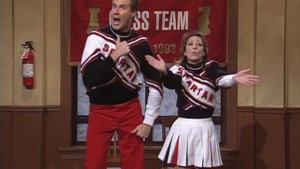One Day Too Late to File Sports CT Claim!
Happy Wednesday, dear readers!
My plan for today’s blog post was to provide you with a list of 10 reasons why, when you have something you need to do, procrastination is not acceptable. Unfortunately, I kept putting this assignment off, so I didn’t get to it in time for today’s post.
Instead, I bring you the case of Walker v. WCAB. By way of background, back in 2013, California was in a middle of a mass hysteria of blood-lust for professional athletes. Basketball players were herded together, only to be tarred and feathered. Angry mobs descended on hockey players, pouring warm water over ice skating rings to create potholes, and burning copies of the Mighty Ducks.
In response, to pacify the angry hordes taking to the streets, the Legislature offered Assembly Bill 1309, which limited out-of-state professional athlete claims for workers’ compensation. As part of the language of the bill, it “would provide that these changes apply to all pending claims for benefits filed on or after [Sunday] September 15, 2013, as specified”.
In Walker, it looks like the applicant filed his application on Monday, September 16, 2013.
The parties were in agreement that, if AB1309 applies, the claim is barred, but applicant argued that CCP section 12a and section 10508 (allowing an additional day to perform an act if the last day to act falls on a Saturday, Sunday, or Holiday), means that the claim should not be barred, because, as the law went into effect on a Sunday, all those injured professional athletes should have an extra day to file their claims.
The WCJ agreed, and found the claim is NOT barred.
Well, on appeal, the WCAB reversed, finding that CCP 12a and section 10508 turn on the last day to perform an action. To the WCAB’s reading, AB1309 did not provide a last day to perform an act, but rather applied additional conditions to filing a claim, such as requiring a minimum amount of time in the State of California prior to filing a pro-sports CT claim. Accordingly, 12a and 10508 do not apply. The WCAB ruled the claim is barred.
The COA denied review of the WCAB’s ruling.
Now, your humble blogger is all in favor of claims being denied, but let’s think about this one for a second – AB1309 did not explicitly provide a statute of limitations, BUT it did create conditions which put an expiration date on certain claims. Given this, isn’t there an implied “last day to perform an act”? Because the law went into effect on a Sunday, Mr. Walker’s last day to file his application would have been a Saturday, which would have extended his last day to file, as applicant argued to begin with.
Another thought, dear readers — since the world has not ended, and we’re all still here, is it time to consider expanding the effect of AB1309? Why just professional athletes? Why only some sports?
What about the guy visiting California to attend a conference in the insurance industry? What about the lady who is in California temporarily to conduct a job interview of a potential hire from a local law school, only to claim a CT in California for her carpal tunnel syndrome? Perhaps we need legislation to require a minimum amount of time in California for ANY CT claim.
Perhaps you’d be interested in joining your humble blogger’s fantasy legislation league?

